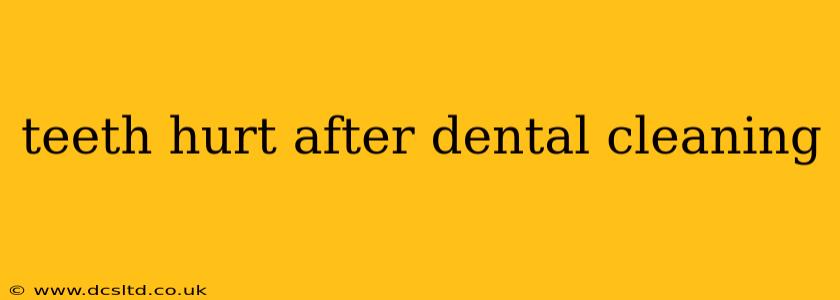It's frustrating when a dental cleaning, meant to improve your oral health, leaves you with aching teeth. Many people experience some degree of discomfort after a cleaning, but persistent or severe pain warrants attention. This comprehensive guide explores the common causes of post-cleaning tooth pain, effective remedies, and preventive measures to minimize discomfort.
Why Do My Teeth Hurt After a Dental Cleaning?
This is a frequently asked question, and the answer isn't always straightforward. Several factors can contribute to post-cleaning tooth sensitivity:
-
Gum Recession: During cleaning, the hygienist might inadvertently expose the roots of your teeth, which are more sensitive than the enamel. This is especially true if you have existing gum recession. The exposed dentin lacks the protective enamel layer, making it vulnerable to temperature changes and pressure.
-
Aggressive Cleaning: While thorough cleaning is essential, overly aggressive techniques can irritate the gums and cause inflammation, leading to pain and sensitivity.
-
Inflammation: If you have gingivitis (gum inflammation) or periodontitis (gum disease), the cleaning process, while beneficial in the long run, can temporarily increase inflammation and cause discomfort. The bacteria and plaque removal can trigger a temporary inflammatory response.
-
Deep Cleaning (Scaling and Root Planing): These procedures, often necessary for gum disease treatment, involve removing tartar and plaque from below the gum line. This is more invasive than a routine cleaning and can result in post-procedural pain and sensitivity.
-
Enamel Wear: Pre-existing enamel erosion or wear can exacerbate sensitivity after a cleaning as the dentin is more exposed and vulnerable.
-
Newly Exposed Cavities: In rare cases, a cleaning might reveal a previously undetected cavity, which will cause pain.
How Long Does Tooth Sensitivity After Cleaning Last?
The duration of tooth sensitivity varies depending on the individual and the cause. For most people, the discomfort subsides within a few days. However, if the pain is severe, persistent, or accompanied by other symptoms like swelling or bleeding, consult your dentist immediately.
What Can I Do to Relieve Tooth Pain After Cleaning?
Several home remedies can provide relief:
-
Over-the-counter pain relievers: Ibuprofen or acetaminophen can help manage pain and inflammation. Always follow the recommended dosage.
-
Desensitizing toothpaste: These toothpastes contain ingredients like potassium nitrate or strontium chloride that help block the nerve signals responsible for sensitivity. Use this toothpaste regularly for several weeks.
-
Saltwater rinse: Gently rinsing your mouth with warm saltwater (1/4 teaspoon of salt in 8 ounces of warm water) can help soothe irritated gums and reduce inflammation.
-
Avoid irritating foods and drinks: Stay away from extremely hot or cold foods and drinks, as well as acidic beverages and sugary snacks, which can exacerbate sensitivity.
-
Soft-bristled toothbrush: Use a soft-bristled toothbrush and gentle brushing technique to avoid further irritating your gums and teeth.
Is Tooth Pain After a Cleaning Normal?
Some mild discomfort is normal following a dental cleaning. However, severe or persistent pain is not. If your pain is intense, doesn't subside after a few days, or is accompanied by other symptoms, contact your dentist. They can assess the situation and provide appropriate treatment.
When Should I See a Dentist After a Cleaning?
Seek immediate dental attention if:
- Your pain is severe or unbearable.
- Your pain lasts for more than a week.
- You experience swelling, bleeding, or fever.
- You notice any unusual changes in your gums or teeth.
How Can I Prevent Tooth Sensitivity After Dental Cleaning?
Good oral hygiene practices are crucial for preventing sensitivity after a cleaning:
- Regular brushing and flossing: Maintain a consistent oral hygiene routine to minimize plaque buildup.
- Proper brushing technique: Use a soft-bristled toothbrush and gentle circular motions. Avoid aggressive scrubbing.
- Regular dental checkups and cleanings: Schedule regular checkups and cleanings to prevent the accumulation of tartar and plaque.
- Fluoride treatments: Ask your dentist about fluoride treatments to strengthen enamel and reduce sensitivity.
By understanding the potential causes of post-cleaning tooth pain and implementing preventive measures, you can maintain optimal oral health and minimize discomfort. Remember, a timely visit to your dentist is key to addressing any concerning symptoms.
